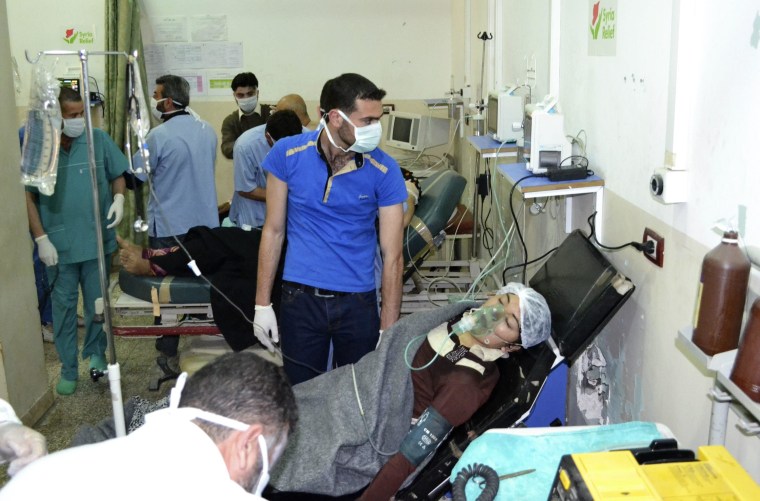While Syria has pledged to rid itself of chemical weapons by the end of this week, an alleged chlorine attack has raised questions about what chemical tricks Bashar Assad might still have up his sleeve.
The U.S. government said this week there were “indications” that a “toxic industrial chemical,” possibly chlorine, was used in Syria during the last month and that it was examining claims Assad's regime was responsible. Some accounts also suggest the possible use of ammonia bombs.
The deal brokered by Washington and Moscow last September which aimed to rid Syria of chemical weapons did not cover substances like chlorine -- which falls into a gray area as a readily available toxic industrial chemical.
If substantiated, the recent attacks would reveal that Assad is effectively exploiting a loophole in the agreement to dismantle Syria’s chemical weapons arsenal.
"If you’ve got a winning formula and that formula is taken away, aren’t you going to try to find something that’s similar that can replace it?"
Chlorine has been weaponized for use by insurgents in Iraq and also during World War I, but countries are not obliged to report its production or trade. That means there is no way to know the size of chemical stockpiles in Syria that Assad was not obliged to report to U.N. inspectors - and which could be used in lethal attacks. If chlorine is used to harm or kill, that would violate the global chemical weapons convention.
If the reports are true and tied to Assad, the use of chlorine gas would be a “brilliant ruse of war by the regime,” said Hamish de Bretton-Gordon, a chemical weapons expert and founder of London-based firm SecureBio.
“Chlorine is so widely used domestically and commercially there must be thousands of tons of it in Syria - as there are in London and Paris,” de Bretton-Gordon said.
Assad agreed to destroy Syria’s chemical weapons following an international outcry after an Aug. 21 sarin nerve gas attack that killed hundreds. Washington blamed the government of Assad for the attack, while the Syrian government and its ally, Russia, blamed anti-government rebels for the attack.
Ammonia, too, can be used to produce homemade explosives. And some powerful insecticides can be used to create homemade nerve agents.
De Bretton-Gordon said he was not surprised to hear reports of “improvised chemical weapons” like chlorine gas bombs. In fact, his firm had identified chlorine, hydrogen cyanide and organophosphate as the “most likely” agents to be used in Syria as part of improvised chemical weapons.
The regime could be turning to improvised chemical weapons because its arsenal has been dismantled and the means to make traditional chemical weapons has been destroyed, de Bretton-Gordon said.
“It struck us as entirely evident this would happen,” Gordon said. “If you’ve got a winning formula and that formula is taken away, aren’t you going to try to find something that’s similar that can replace it?”
However, some chemical weapons experts wonder why Assad might want to make a mockery of the chemical weapons convention with such an ineffective tool.
Jeremy Binnie, Middle East editor with IHS Jane’s Defence Weekly, noted that chlorine gas is not a particularly effective battlefield weapon partly because it moves slowly.
Its use could signal that the Syrian regime could be “running out of things to throw at the rebels,” he said.
